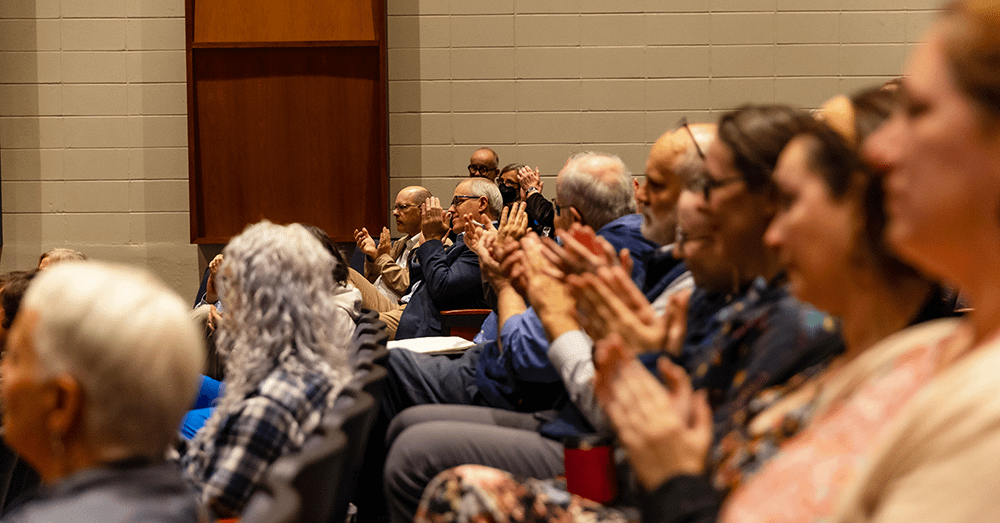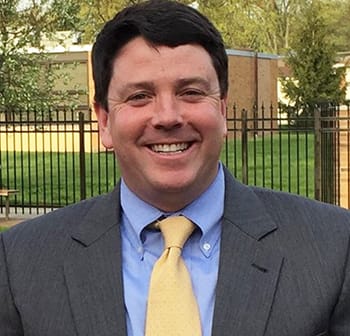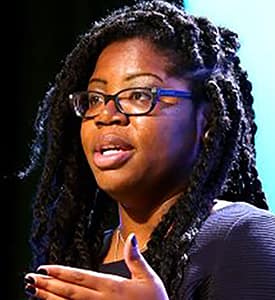Symposium digs to heart of pope’s ecology challenges
With his recent “eco-encyclical” Laudato Si, Pope Francis is challenging American Catholics to set aside recent “pernicious tribalism” inherited from U.S. society at large in order to rebuild a “common Catholic culture” that advances and protects all life and preserves the planet it inhabits.
That was one point of analysis from keynote speaker John Allen, religion writer for the Boston Globe and leading commentator on the Catholic Church, during “A Symposium on Integral Ecology” titled “Saving Our Common Home,” in the McCarthy Recital Hall at Saint Michael’s College on Tuesday, September 8. Students, faculty and community members filled the hall nearly to capacity.
Allen observed that both Catholic activists against legal abortion and Catholic activists for environmental awareness/social justice are “pro-life” in well-established Catholic traditions, yet they commonly and regrettably operate in virtual “gated communities,” too often demonizing one another because they are strangers – an unfortunate reflection of U.S. politics of recent decades. But that need not (and should not) be the case, he said.
By putting the weight of his moral authority behind the climate change issue with an encyclical, the pope “wants to push nations to make more courageous choices,” Allen said, noting this was “the rare case where there’s a way to assess if the encyclical works” – namely, what actions will nations take (or not take) at the United Nations Climate Summit in Paris in December 2015.
As Pope Francis’ highly anticipated late-September visit to the U.S. nears, three Symposium panelists perceived other challenges from the pope in the encyclical too, both to nations and to individuals:
John Erickson, a University of Vermont ecological economist, spoke of Pope Francis as primarily and admirably a “bridge-builder,” but said he also feels the encyclical challenges higher education and the world of finance to adapt a more “embedded” view of man’s proper place in things. Sister Gail Worcelo, SGM, of Green Mountain Monastery challenged our wider spiritual outlook on relationships to one another, God and the earth, based on the work of her mentor, activist/author Father Thomas Berry. Panelist Clive Gray directly challenged some of the pope’s assertions about foreign aid, based on the Harvard-affiliated economist’s long experience in international development work, and Gray took issue with other specific points.
Allen said the pope was inspired to write Laudato Si after a typhoon struck the Philippines last year, driving home to Francis how climate change has dramatically increased the risk of death, destruction and suffering around the world — among the poor in particular. The pope’s subsequent trip to the Philippines, which is an intensely Catholic nation, moved him to become “one man with a profound personal interest, deciding he wanted to do something about it” concerning climate change by meeting the Gospel call to serve the poor concretely, the speaker said.
Allen’s other key points on Laudato Si included:
- That the “the document did not come out of the clear blue sky,” but rather builds on a long tradition of papal teaching going back explicitly to Paul VI who was the first to refer to the environment as a subject for papal teaching, and indirectly, back to Catholic concern for the Earth traceable to St. Francis of Assisi and the early church. So it is “no novelty,” Allen said. He noted that Pope Benedict’s actions, beyond just talk — making the Vatican the first carbon-neutral state, using electric cars, installing 8,000 solar panels — earned him the tag of “the Green Pope.” And John Paul II once said “man must finally realize we are at the brink of disaster,” Allen said.
- That the media tends to over-hype many things Francis does, including the “eco-encyclical,” since the pope is such a media star — but in truth, the encyclical “actually repeals no tradition, but just carries traditions forward, imparting his personal stamp.”
John Erickson of UVM stressed the importance of having a “more embedded view of humanity, knocking us off the top of the ladder of nature.” He appreciates the pope’s “trans-disciplinary approach” to mutual understanding and building bridges “between material and sacred, science and religion, East and West,” and “taking a more modest view of humans” and “our shared destiny with all of life.”
“I read the encyclical and said, ‘Whoa! The pope’s an ecological economist!” said Erickson, who explained that his field and the pope seem to both be about concepts like “dissolving borders,” “integrative,” “economics informed by science,” and being “embedded in the material universe.” Both also appear to be more interested in sustainability than in growth, and in a “fair and equitable distribution of the benefits and burdens of economic cooperation,” he said.
Sister Gail had the audience stand at the start of her remarks to move purposefully and symbolically while reciting a prayer focusing them on connections to aspects of the natural and spiritual worlds – drawing inspirations from St. Francis of Assisi, Saints Benedict and Scholastica. She spoke of the Latin phrase “Ora et labora” linking “prayer and work” on the land in the Catholic tradition, and cautioned against a sense of “soul loss” when we do not duly recognize sensual aspects of the world. “Relationship is at the heart of this universe,” she said, echoing key thoughts from Father Berry, with whom she studied, and whose books call for a transformation of humanity’s priorities in the political/legal order, the economic and industrial world, education and religion.
Sister Gail sat in for the originally scheduled panelist, Sister Bernadette Bostwick, also of Green Mountain Monastery, who was sick. Sister Gail studied with Fr. Berry in the areas of cosmology and the history of the religious life tradition, “with an awareness that all religious traditions are heading toward a new Moment of Grace,” as she has described it. Such ideas characterized her remarks.
While Clive Gray applauded the pope for apparently listening to and taking seriously the assertions of the scientific community on climate change, he challenged the encyclical’s seemingly sweeping dismissal of foreign aid initiatives by international agencies, saying he resents the pope’s use of the phrase “sporadic acts of philanthropy” in the encyclical to characterize development efforts of a type to which Gray has committed much of his life. Gray also said he felt, as one who has worked and lived in the Third World, that the encyclical does not adequately present the challenges of excessive population growth to our common future. And he took issue with the pope’s lament about a “lack of leadership in confronting climate change,” since Gray believes President Obama is providing such leadership.
Laurie Gagne, director of the Edmundite Center for Peace and justice, organized the event, supported by the Sisters of Mercy Peace Initiative, Mercy Ecology, Inc. and Vermont Interfaith Power and Light and the Sisters of Mercy and Mercy Associates Northeast, co-sponsors.
Gagne and Joseph Gainza of Pax Christi Burlington made opening remarks. Gainza spoke of why the encyclical is so important to the pope, science and the rest of the world — “confronted for the first time … with the prospect that our actions may end our evolutionary journey and take millions of forms of life with us.” He said similar right principles lie at the heart of Saint Michael’s and the encyclical, so it was appropriate the Symposium be hosted at the College. Top Saint Michael’s administrators attending included President Jack Neuhauser, Vice President for Academic Affairs Karen Talentino and Dean Jeffrey Ayres.
The pope “recognizes it is us, the common people, who must be the catalyst for change,” Gainza said. “A healthy politics is built from the ground up.” He said he hoped others found the encyclical as “inspiring and informative” as he did, and that it and the symposium “makes you commit to action.”





